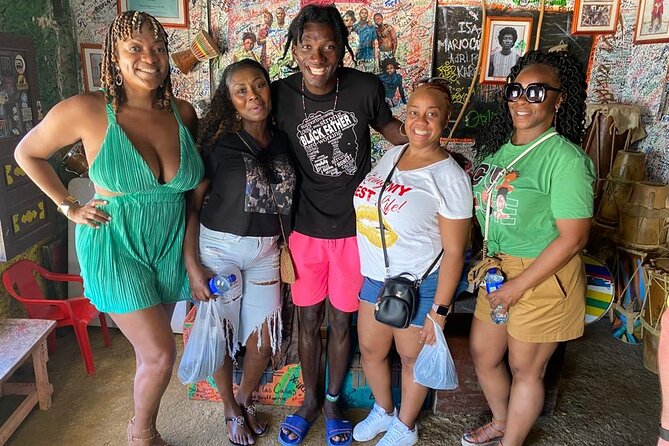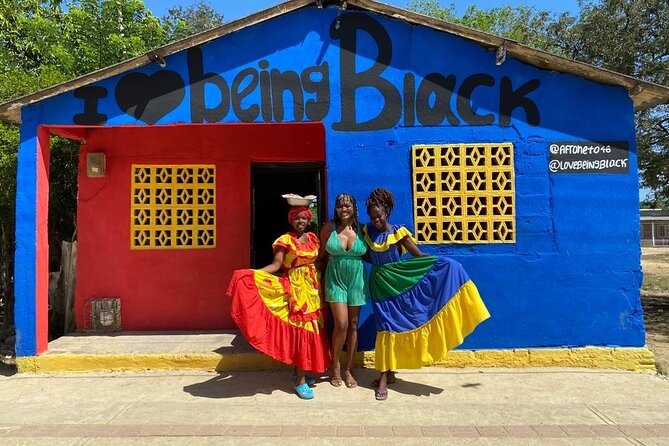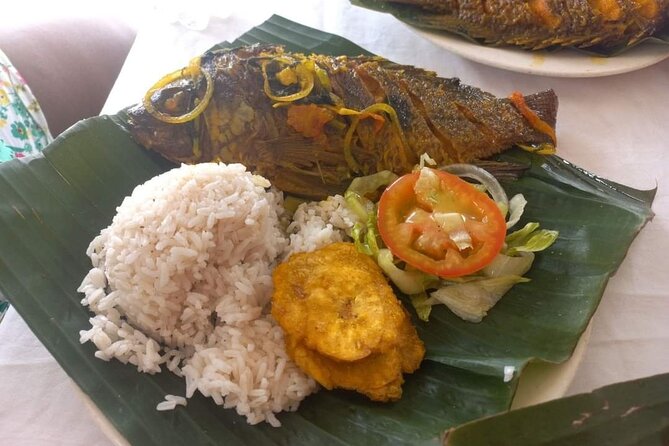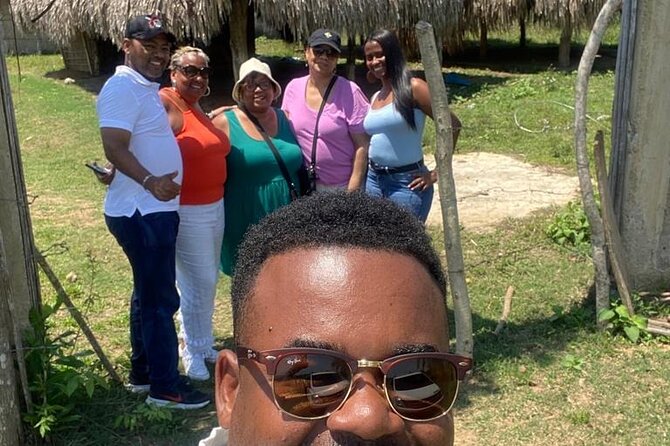Physical Address
304 North Cardinal St.
Dorchester Center, MA 02124
Physical Address
304 North Cardinal St.
Dorchester Center, MA 02124

Captivating exploration of San Basilio de Palenque, Colombia's first free town, where the struggles and resilience of enslaved Africans who forged their own path to liberty are unveiled.
Imagine stepping into a world where the past and present intertwine, where the echoes of a profound struggle for freedom still reverberate. This is the essence of Tour De Palenque, Road to Emancipation – a captivating journey into the heart of San Basilio de Palenque, Colombia’s first free town. Guided by locals, this immersive experience unveils the resilience and cultural preservation that defines this UNESCO-recognized community, inviting travelers to uncover the inspiring story of enslaved Africans who forged their own path to liberty.

You can also read our reviews of more tours and experiences nearby.
The Tour De Palenque, also known as the "Road to Emancipation," offers an immersive cultural experience in Cartagena, Colombia.
It’s highly recommended, with a 97% rating from 610 reviews. The tour costs from $100 per person and picks up guests from various locations between 8-9:30 am, with a maximum of 30 travelers.
It’s not wheelchair accessible, but infants can sit on laps.
The tour explores San Basilio de Palenque, the first free town in the Americas established by escaped slaves. Visitors witness traditional dances, cuisine, and interactions with the warm, proud community.

San Basilio de Palenque, nestled in the lush landscape of Colombia’s Caribbean coast, stands as a beacon of resilience and self-determination. This historic town was founded in the 17th century by escaped enslaved Africans, making it the first free town in the Americas. The community has maintained its unique social, medical, and religious customs, including the use of the Palenquero language.
| Attributes | Description |
|————|————-|
| UNESCO Recognition | Masterpiece of the Oral and Intangible Heritage of Humanity |
| Community Practices | Self-governance, zero crime rate, reliance on natural medicine |
| Resilience | Use of hair braiding to convey escape routes during slavery |
| Uniqueness | Maintains traditional dances, cuisine, and cultural heritage |
This captivating town offers a profound connection to Afro-Colombian heritage, showcasing the power of freedom and the enduring spirit of its people.

Although recognized as a Masterpiece of the Oral and Intangible Heritage of Humanity by UNESCO, San Basilio de Palenque’s cultural significance extends far beyond its prestigious accolade.
This first free town in the Americas, established by escaped slaves in the 17th century, has preserved its unique social, medical, and religious customs. The community’s self-governance, zero crime rate, and reliance on natural medicine showcase its resilience.
Plus, the use of hair braiding by enslaved Africans to convey escape routes highlights the ingenuity and determination of this remarkable Afro-Colombian heritage.

Palenque’s community proudly maintains a range of unique practices that set it apart. The town speaks Palenquero, a creole language descended from Spanish and West African tongues.
Palenque’s community proudly speaks Palenquero, a creole language descended from Spanish and West African tongues, setting it apart.
Residents rely on traditional medicine, drawing on natural remedies passed down for generations. Self-governance and a zero-crime rate are other defining attributes.
Enslaved Africans used intricate hair braiding techniques to secretly map escape routes – a tradition that lives on. This resilience and cultural preservation make Palenque a UNESCO-recognized "Masterpiece of the Oral and Intangible Heritage of Humanity."
Visitors gain rare insight into Afro-Colombian heritage through immersive experiences in the community.
Enslaved Africans demonstrated remarkable resilience in the face of oppression, using intricate hair braiding techniques to secretly map out escape routes.
During the era of slavery, enslaved people employed this ingenious method to convey hidden messages and plans for fleeing their captors.
The braids contained beads, shells, and other objects that encoded vital information, allowing the enslaved to organize and execute daring escapes.
This creative use of hair braiding exemplified the ingenuity and determination of those seeking freedom, showcasing their resilience and the profound humanity that persisted despite the brutality of their circumstances.
The Tour De Palenque offers an immersive cultural experience that transports visitors deep into the heart of Afro-Colombian heritage.
Guided by knowledgeable locals, the tour showcases the unique practices and community attributes of San Basilio de Palenque, the first free town in the Americas.
Guided by knowledgeable locals, the tour showcases the unique practices and community attributes of San Basilio de Palenque, the first free town in the Americas.
Travelers engage with community members and witness traditional dances, local cuisine, and medicinal practices.
The experience is further enriched by visits to dance schools, murals, and other cultural sites, providing an authentic and enlightening journey into the resilience and traditions of this UNESCO-recognized community.
Travelers who embark on the Tour De Palenque rave about the enlightening journey into Afro-Colombian heritage.
With an overall rating of 4.9 based on 610 reviews, the tour earns high praise for its knowledgeable guides and engaging cultural experiences.
Visitors delight in the delicious local meals and captivating performances.
However, some note transportation issues like overcrowded vehicles and inadequate air conditioning.
Despite these occasional inconveniences, the tour is strongly recommended, especially for cultural enthusiasts and those seeking to connect with their African roots.
Although the Tour De Palenque offers a captivating cultural experience, the booking and cancellation policy provides flexibility for travelers.
Travelers can reserve their spot now and pay later, ensuring their place on the tour. Plus, the tour allows for free cancellation up to 24 hours before the experience starts. This policy caters to the dynamic schedules of visitors.
With flexible booking and free cancellation, travelers can reserve their spot and plan around their schedules.
Should travelers need to make inquiries, they can contact the tour operators at the provided phone number for confirmation and further details. The booking and cancellation policy reflects the tour’s commitment to accommodating the needs of its guests.
We've Also reviewed these nearby tours and experiences
No, you cannot bring your own food and drinks on the tour. The tour package includes a traditional local lunch, and the guide will advise you on appropriate food and beverage options during the experience.
The tour guides speak both Spanish and English fluently, enabling them to provide engaging and informative narration for guests from diverse linguistic backgrounds. They’re known for their deep knowledge and ability to bring the cultural experience to life.
There’s no minimum age for this tour, but infants must sit on a parent’s lap. The tour is suitable for all ages, though it may not be wheelchair accessible. Families are welcome to join and experience the cultural highlights.
Yes, you can extend your stay in Palenque after the tour. The tour company doesn’t arrange additional accommodations, but they can provide recommendations on where to stay and how to extend your visit independently.
Travelers should bring a small backpack with essentials like water, snacks, sunscreen, and any needed medications. Comfortable walking shoes are a must, and it’s recommended to wear lightweight, breathable clothing suitable for the weather. Don’t forget to bring your camera to capture the vibrant cultural experiences.
The Tour de Palenque, Road to Emancipation, offers a transformative journey through Colombia’s first free town, founded by escaped enslaved Africans. Travelers enjoy the vibrant Afro-Colombian culture, witnessing traditional dances, savoring local cuisine, and connecting with the resilient community. This UNESCO-recognized experience celebrates the enduring legacy of Palenque, inspiring deeper understanding and appreciation for the triumph of human spirit over oppression.